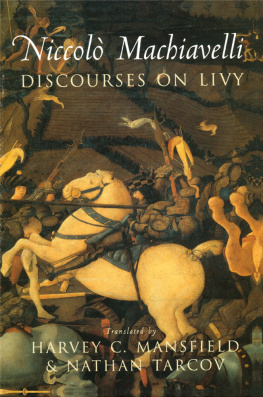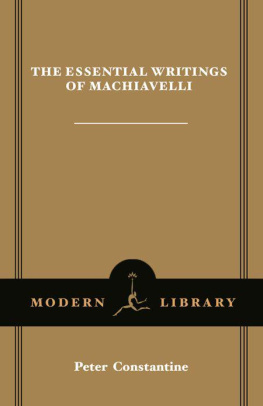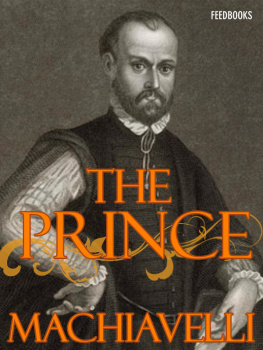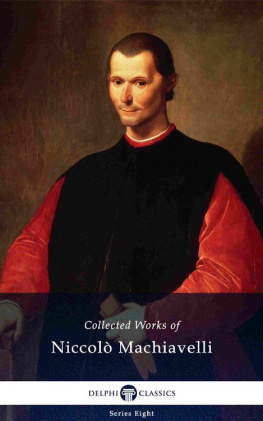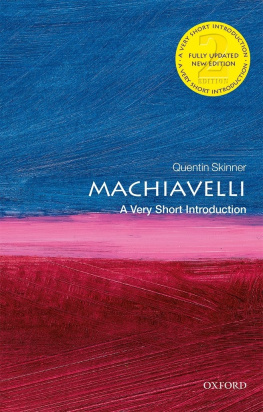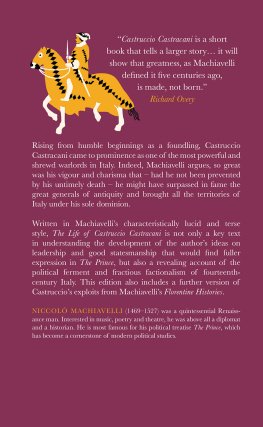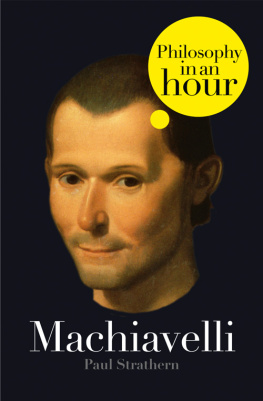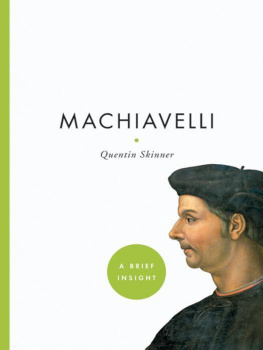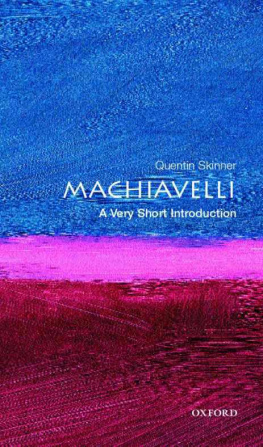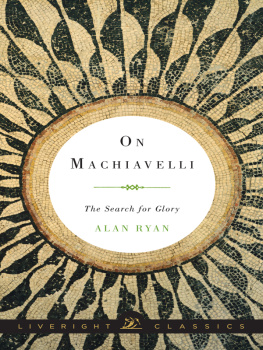Niccolò Machiavelli - Discourses on Livy
Here you can read online Niccolò Machiavelli - Discourses on Livy full text of the book (entire story) in english for free. Download pdf and epub, get meaning, cover and reviews about this ebook. City: Chicago, year: 1998, publisher: University of Chicago Press, genre: Science. Description of the work, (preface) as well as reviews are available. Best literature library LitArk.com created for fans of good reading and offers a wide selection of genres:
Romance novel
Science fiction
Adventure
Detective
Science
History
Home and family
Prose
Art
Politics
Computer
Non-fiction
Religion
Business
Children
Humor
Choose a favorite category and find really read worthwhile books. Enjoy immersion in the world of imagination, feel the emotions of the characters or learn something new for yourself, make an fascinating discovery.
- Book:Discourses on Livy
- Author:
- Publisher:University of Chicago Press
- Genre:
- Year:1998
- City:Chicago
- Rating:3 / 5
- Favourites:Add to favourites
- Your mark:
- 60
- 1
- 2
- 3
- 4
- 5
Discourses on Livy: summary, description and annotation
We offer to read an annotation, description, summary or preface (depends on what the author of the book "Discourses on Livy" wrote himself). If you haven't found the necessary information about the book — write in the comments, we will try to find it.
Discourses on Livy — read online for free the complete book (whole text) full work
Below is the text of the book, divided by pages. System saving the place of the last page read, allows you to conveniently read the book "Discourses on Livy" online for free, without having to search again every time where you left off. Put a bookmark, and you can go to the page where you finished reading at any time.
Font size:
Interval:
Bookmark:
NICCOL MACHIAVELLI

DISCOURSES ON LIVY

Translated by
Harvey C. Mansfield
and
Nathan Tarcov

THE UNIVERSITY OF CHICAGO PRESS
Chicago & London

THE UNIVERSITY OF CHICAGO PRESS, CHICAGO 60637
THE UNIVERSITY OF CHICAGO PRESS, LTD, LONDON
1996 by The University of Chicago
All rights reserved Published 1996
Paperback edition 1998
Printed in the United States of America
05 04 03 02 01 5 4 3
ISBN 0-226-50035-7 (cloth)
ISBN 0-226-50036-5 (paperback)
ISBN 978-0-226-50033-1 (e-book)
The Press acknowledges the generous contribution of
The Lynde and Harry Bradley Foundation
toward the publication of this book
Library of Congress Cataloging-in-Publication Data
Machiavelli, Niccol, 14691527
[Discorsi sopra la prima deca di Tito Livio English]
Discourses on Livy / Niccol Machiavelli; translated by Harvey C Mansfield and Nathan Tarcov
p cm
Includes bibliographical references and index
ISBN 0-226-50035-7 (cloth alk paper)
1 Livy 2 Political scienceEarly works to 1800 I Mansfield, Harvey Clafin, 1932 II Tarcov, Nathan III Title
JC143.M16313 1996
320 973dc20
95-50910
CIP
 The paper used in this publication meets the minimum requirements of the American National Standard for Information SciencesPermanence of Paper for Printed Library Materials,
The paper used in this publication meets the minimum requirements of the American National Standard for Information SciencesPermanence of Paper for Printed Library Materials,
ANSI Z39 48-1992

ABBREVIATIONS
| AW | Machiavelli, The Art of War |
| D | Machiavelli, Discourses on the First Ten Books of Titus Livy |
| FH | Machiavelli, Florentine Histories |
| Livy | Titus Livy, Ab urbe condita |
| NM | Niccol Machiavelli |
| P | Machiavelli, The Prince |

INTRODUCTION
In this introduction we offer a quick tour through Machiavellis Discourses on Livy. We shall mark the four-star attractions that tourists will want to visit repeatedly and wish to remember. The great Machiavellian themes of politics, morality, fortune, necessity, and religion will be set forth, together with the controversies they have touched off. For Machiavelli, to say the least, did not write in such a mode as to prevent dispute about what he said. We consider the fact that Machiavelli wrote at the same time two very different books on the whole of politics, The Prince and the Discourses. We provide a brief appraisal of the latters scholarly reputation today as the first source of classical republicanism, as the recollection of ancient liberty that calls us to venture from the settled and secure realm of property and self-interest. And we present Machiavelli himself, not a disengaged philosopher but the instigator in the schemes he advised, an actor in his own enterprise of bringing new modes and orders... for [the] common benefit of everyone (D I pr.1). As befits an introduction, we try to speak with both modesty and authority.
MACHIAVELLI AND THE RENAISSANCE
Machiavelli lived in the Renaissance, and the Renaissance lived in Machiavelli; the communion between the man and the time seems complete. Jacob Burckhardt, the nineteenth-century historian who established our idea of the Renaissance and who despite new discoveries still reigns over it, gave Machiavelli the greatest prominence in that period and allowed him to define its politics in the section of his famous book The Civilization of the Renaissance in Italy titled The State as a Work of Art.
The Renaissance is a rebirth, the rebirth of the classical times of ancient Greece and Rome. These times had already been reborn, one could say, with the rediscovery of Aristotle in the twelfth century and his adoption by the Christian church, after initial rejections, through the immense achievements and good offices of Thomas Aquinas. It is not customary to consider the work of the scholastics as a renaissance, however, because the distinction between human reason and divine law, required for the adoption of the pagan Aristotle into Christian learning, did not liberate human beings from the tutelage of the church. Even more wayward souls such as Dante or Marsilius of Padua in the early fourteenth century did not take this step; they remained within the broad ambit of scholasticism and stayed true to Aristotle. In Italy later in the fourteenth century Cicero became, as it has been said, the principal figure of the Renaissance. Ciceros rhetoric, as well as his philosophy, came to receive the attention of the learned, and the goal of Renaissance rhetoric became the promotion of a morality of Roman manliness (virtus) that Cicero had glowingly described.
This movement, led by Petrarch in Italy and including such illustrious names as Coluccio Salutati, Leonardo Bruni, Marsilio Ficino, and Pico della Mirandola, was pronounced to be the Renaissance. Part of it is also known as humanism because it concentrated on humane studies, or the humanities, rather than physics, metaphysics, and theology, and it was the immediate intellectual inheritance for anyone born in Machiavellis time. But Machiavelli refused it almost totally and made his own way against his time. In the Discourses he refers to only three modern authorsDante, Lorenzo de Medici, and Flavio Biondoin contrast to nineteen ancient ones. Although the notion of rebirth implies in itself dissatisfaction with current ways, Machiavelli was profoundly dissatisfied with the Renaissance he saw underway. At the beginning of the Discourses he complains that those of his time are content to honor antiquity by buying fragments of ancient statues for their homes and having them imitated rather than by imitating the ancient virtue in politics, of which no sign remains (D I pr.). To remedy their political ills, he continues, they go to the ancient jurists, not to the examples set by ancient princes, republics, and captains.
Thus Machiavelli accepts the necessity of returning to the ancients because they were superior to the moderns, but, waving aside the marvelous works of art created in his own lifetime and even in his own city of Florence under his very eyes, he calls for imitating the deeds of the ancients. He shares in the new esteem for Rome but carries it to the point of preferring Rome to Greece and adopting the imperial Roman republic, and not the Greek polis, as his model. Together with his six references to ancient virtue in the Discourses are four to Roman virtue but none to Greek. Ancient virtue is to be found mainly with the Romans, and especially in the Roman historian Titus Livy, who narrates the deeds of the republican Romans. Because deeds take precedence over words, Rome has primacy over Greece and the historians over the philosophers. Machiavellis complaint against the Renaissance can be seen in his low opinion of Cicero, not a hero for him. Cicero used rhetoric to advance the cause of philosophy, a Greek discovery, in a Rome suspicious of the influence of Greek softness. Machiavelli accuses both rhetoric and philosophy of attempting to rule deeds with words, and he shows sympathy for Catos desire to rid Rome of foreign philosophy that corrupts the virtue of doers (D III 1.3; FH
Next pageFont size:
Interval:
Bookmark:
Similar books «Discourses on Livy»
Look at similar books to Discourses on Livy. We have selected literature similar in name and meaning in the hope of providing readers with more options to find new, interesting, not yet read works.
Discussion, reviews of the book Discourses on Livy and just readers' own opinions. Leave your comments, write what you think about the work, its meaning or the main characters. Specify what exactly you liked and what you didn't like, and why you think so.

